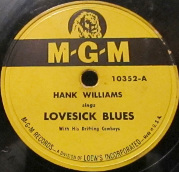| "Lovesick Blues" | ||||
|---|---|---|---|---|
 | ||||
| Single by Hank Williams with His Drifting Cowboys | ||||
| B-side | "Never Again (Will I Knock on Your Door)" | |||
| Written | 1921[1] | |||
| Published | April 3, 1922 Jack Mills, Inc.,[2] November 1, 1949 Mills Music, Inc.,[3] Acuff-Rose Publications, Inc.[4] | |||
| Released | February 11, 1949[5][6] | |||
| Recorded | December 22, 1948[7] | |||
| Studio | Herzog Studio, Cincinnati | |||
| Genre | Hillbilly, Honky-tonk, Country blues | |||
| Length | 2:45 | |||
| Label | MGM 10352 | |||
| Composer(s) | Cliff Friend | |||
| Lyricist(s) | Irving Mills, Hank Williams | |||
| Producer(s) | Fred Rose | |||
| Hank Williams with His Drifting Cowboys singles chronology | ||||
| ||||
| Audio sample | ||||
Hank Williams – "Lovesick Blues" | ||||
"Lovesick Blues" is a Tin Pan Alley song, composed by Cliff Friend, with lyrics by Irving Mills. It first appeared in the 1922 musical "Oh, Ernest", and was recorded that year by Elsie Clark and Jack Shea. Emmett Miller recorded it in 1925 and 1928, followed by country music singer Rex Griffin in 1939. The recordings by Griffin and Miller inspired Hank Williams to perform the song during his first appearances on the Louisiana Hayride radio show in 1948. Receiving an enthusiastic reception from the audience, Williams decided to record his own version despite initial push back from his producer Fred Rose (a former 1920s Tin Pan Alley songwriter) and his band.
MGM Records released "Lovesick Blues" in February 1949, and it became an overnight success, quickly reaching number one on Billboard's Top Country & Western singles chart and number 24 on the Most Played in Jukeboxes list. After a 42 week run, 16 of those weeks at number 1, the publication named it the top country and western record of the year, while Cashbox named it "Best Hillbilly Record of the Year". It was the biggest hit of Hank Williams' career.
Several cover versions of the song have been recorded. The most popular, Frank Ifield's 1962 version, topped the UK Singles Chart. In 2004, Williams' version was added to the National Recording Registry. Miller's 1928 recording was inducted into the Grammy Hall of Fame in 2007, and Williams' 1949 recording in 2011.[8]
- ^ Cite error: The named reference
assignwas invoked but never defined (see the help page). - ^ Library of Congress. Copyright Office. (1922). Catalog of Copyright Entries, 1922 Music First Half of 1922 New Series Vol 17 Part 1. United States Copyright Office. U.S. Govt. Print. Off.
- ^ Harwood 2008, p. 110.
- ^ "U.S. Copyright Office Virtual Card Catalog 1946-1954". vcc.copyright.gov. Retrieved 2021-09-09.
- ^ "Release "Lovesick Blues / Never Again (Will I Knock On Your Door)" by Hank Williams - MusicBrainz". musicbrainz.org. Retrieved 2021-08-19.
- ^ Koon 1983, p. 153.
- ^ "Hank Williams 45rpm Issues". jazzdiscography.com. Retrieved 2021-08-19.
- ^ "Grammy Hall of Fame Award". Grammy Awards. Retrieved 1 May 2024.